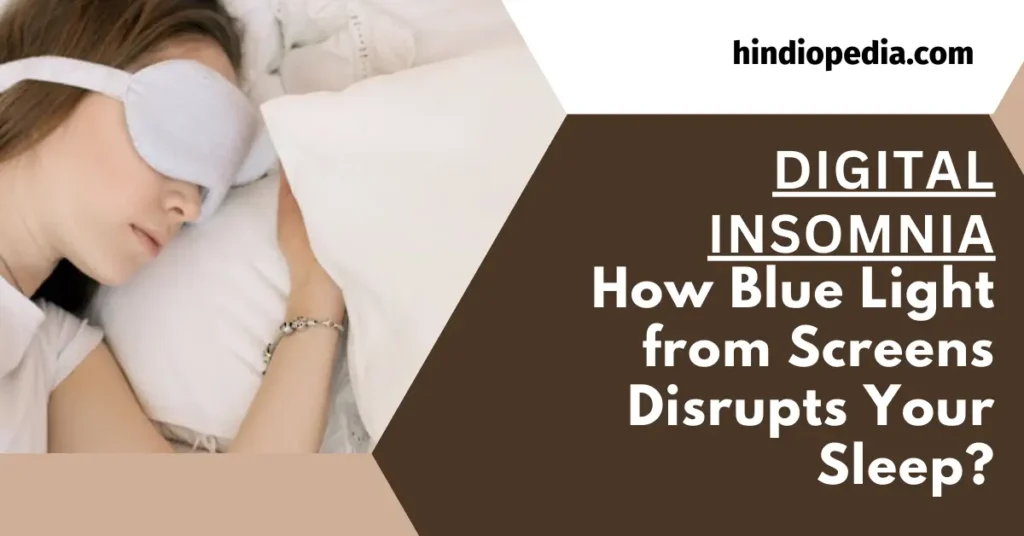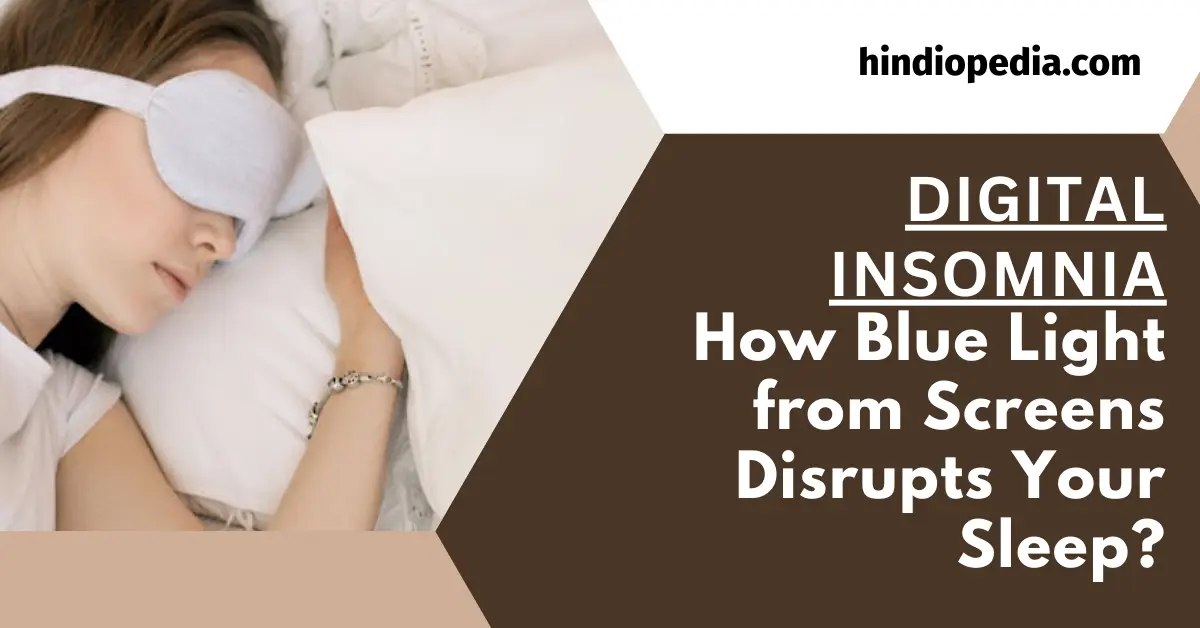Digital Insomnia: The Impact of Screens on Your Sleep and How to Combat
Are you struggling to fall asleep? Do you find yourself tossing and turning at night? Your smartphone might be the culprit. In this digital age, screens are everywhere. They’re in our pockets, on our desks, and even by our bedsides. But these glowing devices may be robbing us of precious sleep. Let’s explore how screens affect our sleep patterns and what we can do about it.

What is Digital Insomnia?
Digital insomnia is a modern sleep disorder. It’s caused by excessive use of electronic devices. These devices emit blue light. This light can disrupt our natural sleep-wake cycle. Many people experience this problem. It’s becoming more common in our tech-driven world.
The Science Behind Screen-Induced Sleep Problems
Our bodies have an internal clock. It’s called the circadian rhythm. This rhythm tells us when to sleep and when to wake up. Light plays a crucial role in this process. Sunlight helps us stay awake during the day. Darkness signals our body to produce melatonin. Melatonin is a hormone that makes us sleepy.
Blue light from screens can trick our brains. It makes them think it’s still daytime. This suppresses melatonin production. A study in the Journal of Clinical Endocrinology & Metabolism found that exposure to blue light can reduce melatonin levels by up to 50% [1].
Types of Screens Affecting Sleep
Not all screens are equal. Here’s a brief overview of common devices and their impact on sleep:
- Smartphones: These are the most common culprits. We often use them right before bed. Their small size means we hold them close to our faces. This increases blue light exposure.
- Tablets: Similar to smartphones, but with larger screens. They can emit more blue light.
- Computers: Desktop and laptop screens can be large sources of blue light. Many people work late on computers. This can disrupt sleep patterns.
- TVs: While further away, TVs can still affect sleep. Especially if watched right before bedtime.
- E-readers: Some e-readers use blue light. Others use e-ink technology. E-ink is less disruptive to sleep.
Table: Blue Light Emission by Device Type
| Device Type | Blue Light Emission Level |
|---|---|
| Smartphone | High |
| Tablet | High |
| Computer | High |
| TV | Medium |
| E-reader | Low to Medium |
The Impact of Screen Time on Sleep Quality
Screen time doesn’t just make it harder to fall asleep. It also affects sleep quality. A study in the journal PLOS ONE found that screen use before bed is associated with:
- Longer time to fall asleep
- Reduced sleep duration
- Poor sleep quality
- Daytime fatigue
The researchers concluded that screen use can significantly impact sleep patterns [2].
How Much Screen Time is Too Much?
There’s no one-size-fits-all answer. However, experts suggest limiting screen time before bed. The National Sleep Foundation recommends avoiding screens for at least 30 minutes before sleep [3]. Some researchers suggest even longer periods.
Age also plays a role. Children and teenagers may be more sensitive to blue light. The American Academy of Pediatrics recommends:
- No screen time for children under 18 months
- Limited, high-quality programming for children 18-24 months
- No more than 1 hour per day for children 2-5 years old
- Consistent limits for children 6 and older [4]
The Psychological Effects of Screens on Sleep
It’s not just the blue light. The content we consume can affect sleep too. Exciting or stressful content can increase alertness. This makes it harder to fall asleep. Social media can be particularly problematic. It can trigger:
- FOMO (Fear of Missing Out)
- Anxiety
- Depression
These emotions can interfere with sleep. A study in the journal Preventive Medicine Reports found a link between social media use and sleep disturbances [5].
Physical Health Consequences of Digital Insomnia
Lack of sleep isn’t just annoying. It can have serious health consequences. Chronic sleep deprivation has been linked to:
- Obesity
- Diabetes
- Cardiovascular disease
- Depression
- Weakened immune system
A meta-analysis published in Sleep Medicine Reviews confirmed these links [6]. Getting enough quality sleep is crucial for overall health.
The Role of Screens in Modern Life
We can’t completely avoid screens. They’re essential for work, education, and communication. The key is finding balance. We need to use screens wisely. This means setting boundaries and creating screen-free times.
Strategies to Combat Digital Insomnia
There are several ways to reduce the impact of screens on sleep:
- Use blue light filters: Many devices have built-in filters. There are also apps available.
- Adjust screen brightness: Lower brightness in the evening can help.
- Establish a digital curfew: Set a time to turn off devices before bed.
- Create a relaxing bedtime routine: Read a book, meditate, or listen to calm music.
- Keep devices out of the bedroom: This reduces temptation to use them at night.
- Use night mode: Some devices have a night mode that reduces blue light emission.
- Take regular breaks: During the day, take breaks from screens to reduce overall exposure.
Table: Effectiveness of Different Strategies
| Strategy | Effectiveness |
|---|---|
| Blue light filters | High |
| Digital curfew | High |
| Bedtime routine | Medium |
| Devices out of bedroom | High |
| Night mode | Medium |
| Regular screen breaks | Medium |
The Future of Screen Technology and Sleep
Technology companies are becoming more aware of this issue. They’re developing solutions. Some new screens emit less blue light. Others automatically adjust based on time of day. Future developments may include:
- Screens that mimic natural light patterns
- Wearable devices that track and optimize sleep
- AI-powered apps that suggest optimal screen usage
However, these technologies are still developing. Personal responsibility remains crucial.
The Bottom Line
Screens have become an integral part of our lives. But they shouldn’t come at the cost of our sleep. Digital insomnia is a real problem. It affects millions of people. By understanding the issue, we can take steps to protect our sleep.
This might mean changing our habits or using technology differently. Remember, good sleep is essential for health and well-being. It’s worth making the effort to preserve it.
References
[1] Gooley, J. J., et al. (2011). Exposure to Room Light before Bedtime Suppresses Melatonin Onset and Shortens Melatonin Duration in Humans. The Journal of Clinical Endocrinology & Metabolism, 96(3), E463-E472.
[2] Christensen, M. A., et al. (2016). Direct Measurements of Smartphone Screen-Time: Relationships with Demographics and Sleep. PLOS ONE, 11(11), e0165331.
[3] National Sleep Foundation. (2020). Electronics in the Bedroom: Why it’s Necessary to Turn off Before You Tuck in.
[4] American Academy of Pediatrics. (2016). American Academy of Pediatrics Announces New Recommendations for Children’s Media Use.
[5] Levenson, J. C., et al. (2016). The association between social media use and sleep disturbance among young adults. Preventive Medicine Reports, 4, 36-41.
[6] Itani, O., et al. (2017). Short sleep duration and health outcomes: a systematic review, meta-analysis, and meta-regression. Sleep Medicine, 32, 246-256.






